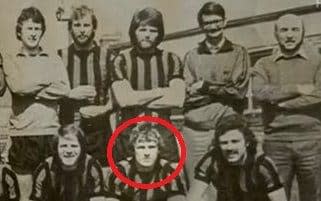Beers and being on the end of robust tackles: How Ralf Rangnick learned about English football at Southwick FC

In his days as a non-league centre-half in the West Sussex team of Southwick FC, David Plant can remember the 1979/80 season for two reasons: the team lost the Sussex County title in the final game and after every match he got a lift home with a young German team-mate studying at the local university.
Now 68, and a retired electrical engineer, Plant is trying to recall, when we chat this week, what car that Ralf Rangnick, Bundesliga coaching visionary and the new interim Manchester United manager, used to drive at the time. It might have been what Rangnick described as a “Fiat 731 Miration” in a Q&A he did in a 1979 Southwick match programme. Either way, Plant recalls, it was not very new. Rangnick, then just 21, would talk football and only football on the few miles back from Southwick’s ground to Falmer where Plant lived.
“He was at Sussex University and I was just married,” Plant says. “He would drop me and head off to his digs on Lewes Road. It was full of student bedsits. He lived in one of those. I have followed his career ever since. I would say to my wife, ‘That’s Ralf Rangnick, from Southwick Football Club, who used to give me a lift home. That can’t be another Ralf Rangnick’. When you think of what he has done – it really is quite remarkable.”
The new United manager was in Sussex for just a year, and has spoken fondly about that time, despite the tackle while playing for Southwick that left him with a punctured lung and broken ribs, and required a three-week stay in hospital. Tracking his team-mates down would have been impossible were it not for an old team-sheet circulated on social media. Forty years have passed and memories are hazy but there is shared pride – and some disbelief – at what Rangnick has gone on to do.
The club wish former player Ralf Rangnick the best of luck as he is set to take over the @ManUtd hotseat.
Ralf played for the Wickers in the 1979/80 season.
viel Glück Ralf!#Wickers pic.twitter.com/rYpv3od608— AFC Southwick (@SFC_TheWickers) November 25, 2021
In Rangnick’s one season, Southwick finished second to Chichester City, missing a penalty in the final game of the season against Chichester that would have swung the title their way. On most Saturday afternoons they drank beer in the clubhouse after games and the expenses the club paid barely covered the petrol money for the journey home. But they loved it and Rangnick’s affection for the club was evident when Southwick FC were brought to their knees financially two years ago. The cost of bringing their old ground up to standard forced them out the league. Rangnick donated £1,000 personally to the cause.
Adrian Batchelor, 63, a retired wealth management advisor, was a team-mate of Rangnick. Batchelor is part of the effort to bring a Southwick team back to the Old Barn Way ground, which is now leased by the foundation set-up by Brighton-boy Russell Martin, manager at Swansea City. The intention is to build a strong community club. Batchelor remembers Rangnick as a useful full-back and midfielder who played around 10 games for the first team and some for the seconds. Batchelor, then a right-back, was playing in the game in which Rangnick was injured.
“It was one of those robust tackles from the 1970s” Batchelor says. “Ralf was quite slight and I suppose it was unfortunate. I appeared on a documentary about him made for German television and in that Ralf says his time in England was when he learned that more physical side of the game. He puts it down as a big part of his development. He was a good player. A nice bloke who took his football very seriously.”
The stories of Rangnick studiously warming up on his own while his team-mates sought the warmth of the clubhouse are also true. “He was quite happy to go out an hour before and have a run around,” Batchelor recalls. He notes that programme Q&A with Rangnick that asked the usual questions that were asked of footballers in the 1970s. “To the question ‘Ambition?’ Ralf had said ‘Pro football’,” Batchelor says. “I look at that now and think at 21 he must have known then he wouldn’t be a professional footballer so he surely meant a coach of some sort. He knew then what he wanted to do.”
The club captain around that time was Phil Quinlan, now 69, a retired financial advisor, and he recalls the final title decider against Chichester. A print strike meant that the local newspapers could not publicise the game yet even so, Quinlan says around 2,000 turned up. Rangnick was on the bench and watched as striker Mick Edmonds missed the penalty that would have won the league. A fitting introduction to English football. “We had won the first nine games of the season, but somehow we still needed to beat Chichester to win the title,” Quinlan says.
“It was only a few years ago that someone said to me, ‘This bloke who is high up in German football used to play with you at Southwick’. At first I just couldn’t place it, and then I looked at the pictures and it was Ralf, that young lad from all those years ago”.

